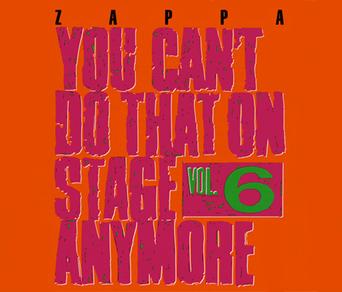 The sprawling You Can’t Do That On Stage Anymore series presented the good, the bad, and the ugly throughout years of performances. This is thoroughly demonstrated on the first disc in this final volume, which deals explicitly with “the topic of sex (safe and otherwise)”.
The sprawling You Can’t Do That On Stage Anymore series presented the good, the bad, and the ugly throughout years of performances. This is thoroughly demonstrated on the first disc in this final volume, which deals explicitly with “the topic of sex (safe and otherwise)”.Of course, it wasn’t enough to write songs about sex; Frank wanted to talk about it too, so several monologues and raps on the topic dot the disc. That said, “The M.O.I. Anti-Smut Loyalty Oath” from 1970 is a mildly humorous statement in the wake of Jim Morrison’s obscenity trial. “The Poodle Lecture”, spoken over the “Stink-Foot” rhythm, kinda fits into the theme, as a setup for “Dirty Love”. Less successful are “The Madison Panty-Sniffing Festival”, which is exactly what it sounds like, and “Lonely Person Devices”, which sets up “Ms. Pinky”. His diatribe about Peter Frampton’s “I’m In You” is less necessary when “I Have Been In You” appears twenty minutes later, bookended by improvs on “The Torture Never Stops” with a very loud sex tape over the PA. It’s back to the Fillmore with Flo & Eddie for “Shove It Right In”, the extended groupie suite from side two of 200 Motels, and admittedly rocks. “Wind Up Workin’ In A Gas Station” is notable for the vocal work by the onetime Bianca Thornton, and the 1984 run from “Dinah-Moe-Humm” to “Muffin Man” is mostly good.
The second disc is mostly more musical, with such highlights as the complicated “Thirteen” with L. Shankar on electric violin; he returns a half-hour later for “Take Your Clothes Off When You Dance”. Patrick O’Hearn’s “Lobster Girl” bass solo nicely seques into “Black Napkins” with the 1976 horn section that unfortunately jars to 1984 for the guitar solo. (“The Illinois Enema Bandit” was cobbled from at least six sources.) Even “Catholic Girls” and “Crew Slut” are generally played more for dexterity than laughs. Breaking up the flow is an operatic monologue by Lisa Popeil, who sang on “Teen-age Prostitute”. “Lonesome Cowboy Nando” combines a 1988 performance full of in-jokes with one from 1971 with Jimmy Carl Black, which leads into the “200 Motels Finale” from the same show. The disc, and the series, ends with a “Strictly Genteel” from 1981.
So after twelve CDs’ worth of music, what have we learned? Well, as much as he insisted that “Touring Can Make You Crazy”, he was a guy determined to have a good time, all the time. He worked his bands and when they rose to the occasion, they were stellar. The fact that he could edit sections from multiple performances is just as much of a testimony to his ear as to the tightness of the bands—even if he insisted the edits were necessary due to the bands’ ongoing inability to play the stuff correctly. If anything, the series fostered a new generation of Zappa scholars, who would continue to dissect these and other live recordings over the years. Those who collected all six volumes could even procure a road case to keep them in.
Frank Zappa You Can’t Do That On Stage Anymore Vol. 6 (1992)—2
No comments:
Post a Comment